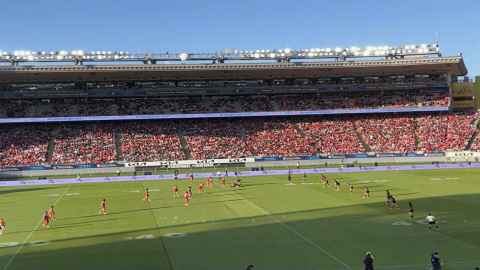Sporting arena amplifies Pacific pride for diaspora
17 November 2025
The Rugby League Pacific Championships has seen a display of passion and honour for heritage homelands.

The success of the recent Rugby League Pacific Championship demonstrates sport has been a space where Pacific peoples have been welcomed with open arms.
“We see that across varying sports, but especially rugby union and rugby league,” says Waipapa Taumata Rau, University of Auckland Pacific Studies lecturer Dr Sarah McLean-Orsborn.
Diaspora turned stadiums into seas of red and blue, demonstrating Pacific pride. The NRL Pacific Championships saw record-breaking crowds, with 45,000 fans in Brisbane and almost 40,000 at Eden Park, while millions tuned in worldwide.
For many Polynesian youth, particularly our young men, says Dr McLean-Orsborn, these league players have been role models, but for many Pacific families they have also become symbols of success.
Pacific families migrated to New Zealand for educational and employment opportunities for themselves and future generations, transforming the nation’s cultural landscape over the past six decades.
From just 14,000 Pacific-born residents in 1961, numbers surged during the 1960s to 1970s labour migration schemes, reaching 66,000 by 1976. Today, more than 442,000 people identify as Pacific, making up 8.9 percent of the population, with Auckland as the heart of the diaspora.
“We know that for many, it started on factory floors – such as the Onehunga Wool Mills or the Westfield Freezing Works. This physically arduous labour saw many push their children and grandchildren towards higher education in hopes that the labour they would take up would be mental as opposed to physical.
“It is fair to say that during this time, recreational activities and hobbies were not actively encouraged or pursued because it could be seen as a distraction or deviation from this greater goal and vision – particularly because many of these occupational spaces had not previously had Pacific representation in them.”
She says the support and pride proudly displayed for national sports teams is an indicator that many Pacific families have achieved the success that their parents, grandparents and great-grandparents came to New Zealand in search of.
“This is why we are seeing families supporting their young ones to pursue professional sporting careers – because we see the value and the potential.”
No longer are we needing to assimilate and trying to blend in or to disguise our Pacific-ness – we are able to be loud and proud with our language, flags and sirens.

McLean-Orsborn says seeing Pacific transnationals embrace their cultural heritage, despite not having set food in their homelands, shows how the tide has turned since earlier generations first arrived in Aotearoa and Australia.
“No longer are we needing to assimilate and trying to blend in or to disguise our Pacific-ness – we are able to be loud and proud with our language, flags and sirens (although some respect to hours of when this is appropriate would be appreciated)."
She says this is also seen in the fact that many of diaspora children of the Moana wish to play for their cultural homelands' national teams.
“This shows we are still maintaining connections in a meaningful manner. For our players who are island-born and raised, support from communities beyond the homeland are key pillars of support, to show that there is an international gaze on how government funding and support is procured and utilised in regard to sports.
“We have seen, unfortunately, on a number of occasions, the need for our transnational communities to call out the lack of transparency and the inequality and inequity our island sports teams endure.”
The last couple of years have been hard for our Pacific communities, says McLean-Orsborn, but the sports arenas have been a place of solidarity, joy and love – a pseudo village for Pacific communities to rally together and be reminded that there is strength in numbers, and that they can collectively support one another.
“While this has been beautiful to witness, I do hope that we turn our gaze to the political arena and explore the ways that we can engage in that space.”